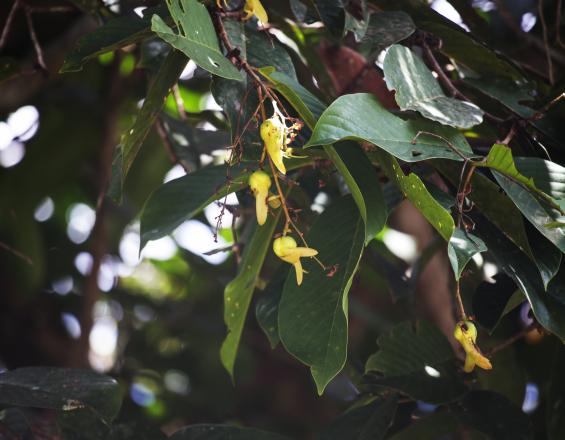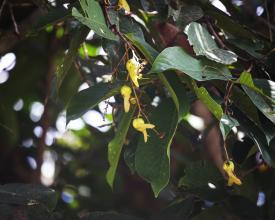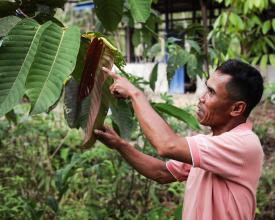
From Forest to Market: Fostering Green Economic Growth and Biodiversity Conservation in Indonesia

Indonesia's biodiversity includes many endemic, often threatened tree species such as the Tengkawang tree (Shorea stenoptera), which bears fruit from which oil can be extracted. This oil has been used by the indigenous Dayak people for centuries for cooking, skin care, and ceremonial purposes. Because Tengkawang oil has properties similar to cacao butter and can act as its substitute, it has become a desirable commodity in the cosmetics industry. The project aimed to contribute to nature-positive economic recovery by adding value to the Tengkawang oil supply chain, offering local communities additional sustainable income sources while reducing pressures associated with timber extraction on the forest ecosystem. Thereby, the solution comprised addressing each step along the Tengkawang fruit value chain: from establishing tree nurseries and building capacity for harvesting and processing, to expanding a network of Tengkawang actors and empowering communities to plan business activities.
Context
Challenges addressed
Indonesia has lost large areas of primary rainforest to plantations and mining operations in the last decades. Even where fragmented, tropical rainforests still provide habitat for multitudes of wildlife species and act as wildlife corridors between larger rainforest complexes. As endemic tree species, Tengkawang trees hold cultural value for the indigenous Dayak people and contribute to the functions of the forest ecosystem. From 2012, the export of Tengkawang fruit was prohibited by the government for several years, which led to Tengkawang trees being felled due to their valuable timber. This export stop has now been lifted.
The COVID-19 pandemic negatively impacted Indonesia's economy throughout 2020 and 2021, which increased the risk for communities to choose unsustainable land use to secure their short-term financial needs. In response, the Indonesian Ministry of National Development Planning (BAPPENAS) prioritised green recovery initiatives in the Indonesian national planning and budgeting processes.
Location
Process
Summary of the process
The interaction between the building blocks means that all parts of the Tengkawang value chain are addressed. From replanting to establishing Tengkawang conservation management standards and processing methods, strengthening group institutions, providing facilities, expanding market access, to fostering networks and collaborations with stakeholders - all of these are important aspects for Tengkawang development. The combination of all activities results in a holistic approach to a green economy that brings sustainable economic benefits to local communities while rehabilitating and protecting the endemic Tengkawang tree species.
Building Blocks
Planting and creation of framework conditions
The planting of Tengkawang seedlings and the provision of processing tools for the extraction of Tengkawang oil form the framework conditions for the production of Tengkawang butter and derived products.
Enabling factors
The project area in West Kalimantan provides the right environmental conditions for this endemic tree species. Here, the community believes in the ecological, economic and social value of Tengkawang trees and that by preserving the Tengkawang tree species growing on the banks of the river, the supply of clean water will be maintained.
Lesson learned
It is necessary to bring together the self-taught approaches and experiences of the community in establishing the Tengkawang nurseries, planting the seedlings and caring for them, and the production standards introduced and agreed upon by the parties working with Tengkawang.
Capacity development
Pre- and post-harvest Tengkawang management workshops were conducted, including training sessions on Tengkawang nut processing, oil extraction and production of derived products. Pre- and post-harvest tengkawang management guidelines, posters and brochures were distributed to ensure sustainable knowledge and capacity for future harvests.
Enabling factors
The community was made aware of the additional potential of Tengkawang when processed into derivatives. There is a strong desire and interest from the community to process Tengkawang fruit. However, a prerequisite for this process is a government policy that enables a market for Tengkawang fruit and its derivatives.
Lesson learned
As Tengkawang harvesting is only possible every three to five years, these training sessions need to be held more than once. The refresher trainings will further consolidate the knowledge acquired by the community. The training material should be produced in the form of publications that can be easily stored and reused by the community, e.g. in the form of pocket books with illustrated material and with information that is easily accessible to the community.
Business management
Identification of certification and licensing requirements and mechanisms for the management, processing and sale of Tengkawang, followed by the development of a Tengkawang business plan.
Enabling factors
The existence of a domestic market open to non-timber forest product (NTFP) commodities as green and environmentally friendly products is an important prerequisite. The information links between producers (Tengkawang tree owners) and buyers of Tengkawang products help to create a business plan.
Lesson learned
Licences issued by the government are required to collect NTFPs. Acquiring this licence means that the communities are legally entitled to manage and use their NTFPs. The relationship between the owners of Tengkawang trees and the buyers must be maintained through interdependence. The community as the collector fulfils all the requirements set by the buyer, while the buyer takes over the entire Tengkawang harvest from the community.
Establishment of a network
Provision of a platform through the Tengkawang network for communication between various stakeholders at the district level to facilitate decision-making, management and sales of Tengkawang butter and derivatives.
Enabling factors
The existence of institutions at local and sub-national levels (Tengkawang networks) is intended to serve as a bridge between farmers and Tengkawang buyers. The Tengkawang Network is an independent forum, but its members include government representatives, representatives of NGOs and donor partners, representatives of private companies, academics and community groups.
Lesson learned
It was found that many tengkawang species have different harvest times. This is also the case for Tengkawang in other districts. Currently, the Tengkawang Network Node only exists in the Kapuas Hulu Regency. In order to become an information hub between districts, the establishment of networks in other districts with Tengkawang potential should also be considered. As the Tengkawang network is a voluntary forum, financial support from stakeholders is required to carry out the network activities. In order to obtain funding, the Tengkawang Network must be transformed from a forum into an institution with legal status.
Impacts
Four collector groups in Kapuas Hulu, West Kalimantan have been equipped with the knowledge, skills, and necessary permits to gain income from future Tengkawang fruit harvests. The collector groups now have the capacity to collect around 60 kilograms of fruit daily (per household) during the harvest season. With the equipment to process the fruit into oil, the income generated through the sale of the oil as compared to the sale of the unprocessed fruit will be about 20 times higher per sold kilogram. The established Tengkawang network consisting of 94 community members (among which 46 are women) will help in fostering a conducive business environment by eliminating administrative costs and enabling collectors to bulk their produce to get better wholesale prices. The Kapuas Hulu Tengkawang Network Node now consists of representatives from local government, civil society organisations, and seven community groups from three districts.
Simultaneously, the planting of Tengkawang trees and the promotion of the value of Tengkawang fruit has contributed to the gradual restoration and conservation of this tree species and its associated biodiversity. Since October 2021, 16,000 Tengkawang seedlings have been cultivated, of which 80% were planted successfully.
Beneficiaries
Local communities in four villages located in the Labian Leboyan watershed in Kapuas Hulu are supported to increase their capacities for adding value to the Tengkawang value chain.
Sustainable Development Goals
Story
Excerpt from a transcript of a beneficiary interview from the Kapuas Hulu Tengkawang Network:
"Our hope for the future related to Tengkawang management is that we can adopt, imitate and develop it in our respective regions, especially in terms of how we accommodate and process Tengkawang in our area. In addition, we should not only focus on Tengkawang fruit, but we can utilise other fruit to be processed with the same equipment, especially when we are waiting for the Tengkawang harvest season."



